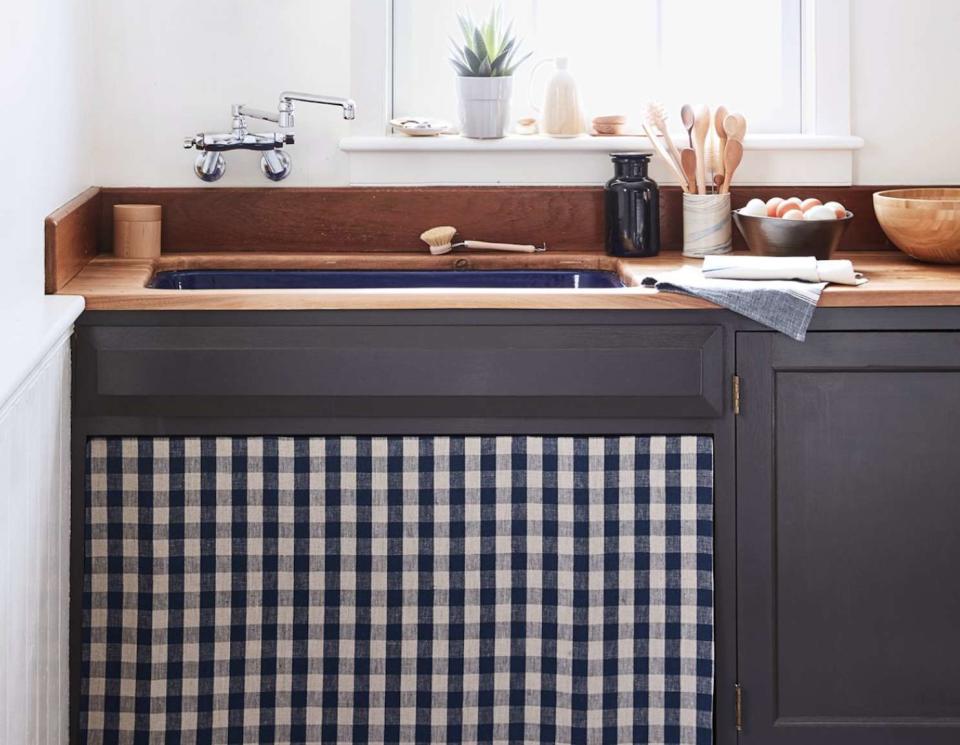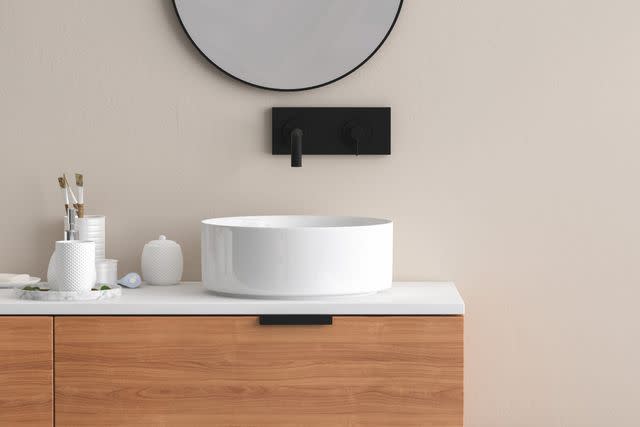17 Things You Should Never Store Under Your Sink (but Probably Are)
Plus, where you should place these items instead.

Lennart Weibull
The space under your kitchen or bathroom sink may seem like a savvy place to stash certain items you don't want on display, but not everything can be safely placed in these spots. The dark and often damp conditions can create a breeding ground for mold and mildew, which can ruin certain materials. And the moisture can cause other problems, as well. To keep your belongings safe, we're sharing common items you should never store under the sink.
Meet the Expert
Jennifer Rodriguez, chief hygiene officer at Pro Housekeepers
Alicia Sokolowski, president and co-CEO of AspenClean
Margarethe A. Cooper, Ph.D., assistant professor of practice and Victor P. Smith Endowed Chair in Food Safety Education at the University of Arizona
Related: Learn How to Organize the Space Beneath Your Kitchen Sink
Items That Shouldn't Be Stored Under the Kitchen Sink
While it makes sense to use the cabinets under the kitchen sink for certain miscellaneous items that don't fit anywhere else—like trash bags and extra cleaning supplies—certain things should never see the interior of this space.
Small Kitchen Appliances
Small appliances, like your crock pot, pressure cooker, and blender, should not be stored under the sink. "They could get damaged by any leaks coming from the sink," says Jennifer Rodriguez, the chief hygiene officer at Pro Housekeepers. Instead, store these items in a spare kitchen cabinet or in a closet or pantry that's close to your kitchen.
Paper Products
The space under your kitchen sink may seem like a great place to keep backup paper towels, paper bags, or napkins handy, but these items are in danger of being destroyed by moisture and leaky pipes. If you have a pantry, linen closet, or even a shelf in the garage, you should opt to keep your extra paper goods there.
Dishwasher Pods
Storing dishwasher pods under your kitchen sink is a natural choice, as it's typically in close proximity to the dishwasher. But keeping dishwasher pods under the sink exposes them to potential water leaks or spills from plumbing fixtures or pipes, says Alicia Sokolowski, president and co-CEO of AspenClean. "Water exposure can cause the pods to dissolve or break down prematurely, rendering them ineffective," she says.
Cleaning Products
There are a few reasons cleaning supplies shouldn't be stored under the sink. First, under-sink storage areas are easily accessible to children and pets, and cleaning products may pose a health risk if ingested. Additionally, leaks from plumbing can damage cleaning product containers, leading to spills or leaks of potentially hazardous chemicals, says Sokolowski. Also, many cleaning products need proper ventilation, and airflow can be restricted in the area under your sink.
Onions or Potatoes
Onions and potatoes should be kept somewhere dry, dark, and cool. The area under the kitchen sink is too damp for these items. Onions and potatoes are also often kept in bags or containers that allow air circulation, making them vulnerable to leakage that may occur under the sink, says Margarethe A. Cooper, Ph.D., assistant professor of practice and Victor P. Smith Endowed Chair in Food Safety Education at the University of Arizona.
Flammable Products
Under-sink areas are often close to heat sources such as water heaters, pipes, or appliances like dishwashers, says Sokolowski. "Flammable products stored in these areas can easily ignite if heat exposure leads to a fire," she says. Additionally, flammable products are often stored in containers that may leak or spill, and if a flammable liquid leaks under the sink, it can pool or spread, increasing the risk of fire.
Pet Food
Just as you shouldn't store human food under the sink, you also shouldn't keep pet food there. "Storing pet food in the same area as other items increases the risk of cross-contamination," says Sokolowski. "Spills or leaks from products can contaminate the pet food, potentially exposing your pet to harmful chemicals or bacteria."
Related: Martha's 39 Best Kitchen Organizing Tips Will Help You Make the Most of Your Space
Cookware
Avoid storing cookware, like pots and pans, under your sink. "If there is any leaking or dripping due to condensation or moisture introduced from washing dishes, it can potentially contaminate cookware," says Cooper. Instead, keep these items in your kitchen cabinets or in a nearby closet.
Food Storage Containers
Like cookware, food storage containers also shouldn't be kept under your kitchen sink. Condensation or dripping from leaky pipes could potentially contaminate food containers, which could transfer to your food. Keep these containers in a kitchen cabinet or in your pantry.
Sponges
Sponges provide an ideal environment for bacterial growth due to their porous nature and ability to retain moisture, says Sokolowski. When stored under the sink, sponges can become damp, harbor bacteria, and develop unpleasant odors and mold growth over time.
Batteries
Under-sink storage areas may experience temperature fluctuations, especially in kitchens where hot water pipes or appliances create additional heat. "These temperature changes can affect the performance and lifespan of batteries, causing them to lose charge more quickly or even leak," says Sokolowski.
Insecticides and Pesticides
Keeping insecticides and pesticides under the sink makes them easily accessible to children and pets. These products contain chemicals that can be dangerous if ingested.
Fire Extinguishers
In case of a fire emergency, quick and easy access to a fire extinguisher is essential. Storing it under a crowded sink can impede accessibility. What's more, humidity can corrode the metal components and compromise its functionality over time, says Sokolowski.

Items That Shouldn't Be Stored Under the Bathroom Sink
Items we use most often should be readily accessible—which is why we tuck many of our daily essentials under the bathroom sink. But not all of your favorite beauty and wellness items are safe there.
Linens
Storing towels, washcloths, extra bathmats, and other linens in close proximity to plumbing fixtures under the sink increases the risk of contamination if there are leaks. "Linens that come into contact with water from plumbing fixtures may become soiled or contaminated, posing hygiene concerns if used for drying or cleaning," says Sokolowski.
Makeup
Makeup should be stored in a cool, dry place. Temperature fluctuations and humidity, which are common under the bathroom sink, can impact the quality and shelf life of makeup products. "Extreme temperatures can cause certain ingredients to degrade, affecting the effectiveness and safety of the products," says Sokolowski.
Related: 21 Bathroom Shelf Ideas That Add Storage and Style
Toilet Paper
Leaks from plumbing fixtures or pipes under the sink can occur unexpectedly, says Sokolowski. If toilet paper is stored there, it can get damaged by water leaks, leading to waste and a potential mess. Even just excess moisture from condensation can lead to mold or mildew growth on your toilet paper.
Hair Tools
Hair tools, like straighteners and curling irons, which have electrical components, can be damaged if they come in contact with water from leaky pipes under the sink. Instead, keep your hair tools in a bathroom cabinet or nearby linen closet.
Read the original article on Martha Stewart.

